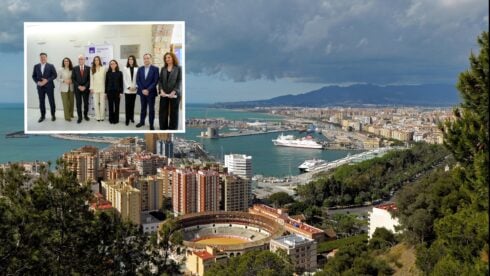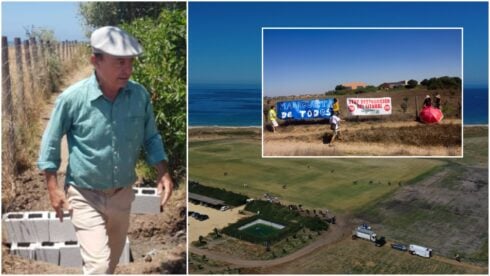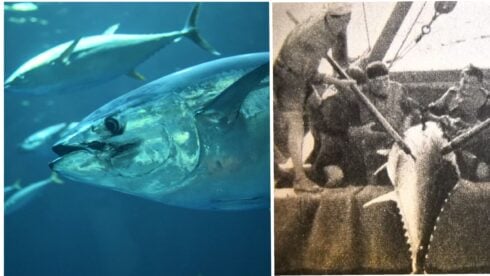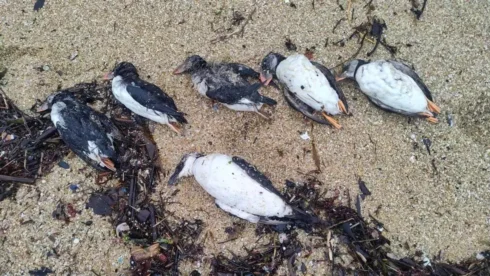
THE latest Blue Flag report offered a dazzling reporting on Spain’s beaches.
The Foundation for Environmental Education created a map that blanketed the country’s coastlines in blue dots, indicating beautiful clean beaches with excellent water quality, compliance with coastal laws, and services such as lifeguards and toilets.
Out of the 694 beaches that applied for the cherished blue flag, the group merrily handed them to 638 – an approval rate of 91%.
However, an alternative report from environmental group Ecologists in Action offers a darker vision of the health of Spain’s beaches.
The group’s Black Flags report, released in June, gave out 48 black flags around the country, including 10 in Andalucia, six in Valencia, two in the Balearics and four in the Canary Islands.
READ MORE: THESE are the 48 beaches handed ‘black flags’ for pollution, mass tourism and over development

But in reality the number should have been even higher.
“Many of the beaches that received a blue flag actually should get a black flag,” Ecologists in Action coordinator Rafael Yus-Ramos told the Olive Press.
“But we can’t give a black flag to every beach that deserved one because otherwise we would have ended up with too many to count.”
The report comes in a year when anti-tourism protests have broken out in hotspots across Spain, ‘excessive’ seafront developments have been approved in the Canary Islands and Malaga, and 26 tonnes of plastic pellets were washed overboard a container ship into the sea off the coast of Cantabria.
The trend causing the most harm to Spain’s beaches, however, is ‘the touristification and urbanisation of our coastlines’, according to the environmental group.

The Canary Islands come in for keen criticism for leaving an ecological footprint 27 times larger than their landmass.
Yet the villains are not the tourists occupying the hotels and Airbnbs but the political class, who ‘flaunt multi-billion dollar profits while more than 35% of the population is at risk of poverty and the unemployment rate is 20%.’
In Tenerife, development has restarted on two hotels, Hotel La Tejita and Hotel Cuna del Alma, which were stopped for environmental violations.
And in Fuerteventura a golf course and a wellness centre with more than 2,000 beds each have both been approved.
“These are just a few examples, among many,” the report states, “that demonstrate the suicidal race that our leaders are betting on which exclusively benefits business interests.”
But the Black Flags report saves some of its strongest criticism for the Costa del Sol, which receives two of the unwanted awards.

A number of beach bars have been approved despite receiving negative reports for environmental law violations, the report claims.
Ecologists in Action have pointed the finger at the Junta de Andalucia for ignoring the damning reports and ploughing ahead with development regardless.
In the most shocking case, it gave out a licence to build Bikini Beach Club at the foot of the Fuengirola castle.
The 440-metre behemoth is being built directly on the sand – with basement included – not far from an archeological site, in plain violation of coastal regulations.
“It all comes down to the country’s laws which regulate coastal developments,” Yus-Ramos said.
“There are things you can do and things you can’t, and the Junta just ignores it.
“The town halls submit plans for beach developments but it’s the Junta which has to approve them.
READ MORE: Spain’s aviation sector looks to a green future by setting up country’s first hydrogen airport hub

“The ultimate responsibility for these black flags lies with the Junta de Andalucia.”
The report also pulled Malaga up for the massive plastic waste generated by the San Juan festivities on June 23.
“The night of San Juan left the beaches covered in plastic,” Yus-Ramos said. “In the end, much of that plastic waste goes in the sea.”
The group estimates that between 20 and 40 tonnes of litter was left on beaches come the morning.
Ecologists in Action has called for more bins to be placed on the beach for the event and signs warning of the harm caused by litter.
It added: “Ideally, these massive festivities should gradually decline until they disappear.”
Yus-Ramos added that constant construction and development all along the Costa del Sol has led to the disappearance of many beaches, which now have to be regularly replenished with artificial sand.
“In Cadiz there are sandy natural beaches that still have dunes,” he continued. “But these have completely disappeared in Malaga.

However, Cadiz does not escape lightly, receiving four black flags, with said dunes on the Trafalgar coast between Tarifa and Vejer being a particular concern.
“The current urban development between Zahara and Atlanterra is dismantling the natural barrier that has protected the region’s dune systems,” the report states.
It adds that there are nearly three kilometres of formerly pristine beach that are now occupied by illegally-built urbanisations that ‘lack basic infrastructure for water supply and wastewater treatment’.
Incredibly, plans are already underway to expand the illegal developments with two water-hungry golf courses.
Sewage waste has been seeping into Playa Talamanca in Ibiza and both Playa Granada and Playa Poniente in Granada.

This has been killing off the seagrass meadows that grow just off the coast, with over half of the fields in Talamanca Bay now dead.
And do not even ask what is escaping into the Alicante beach of El Barranco del Amerador.
Ok we’ll tell you: “So far this year, there have been two faecal discharges at the Amerador beach from the pumping station located in the ravine, due to overflow and lack of maintenance.
It’s a similar story at Alicante beach, where the population has doubled in the last 40 years without a similar investment in local infrastructure.
“The risk of new discharges could produce not only visible items like wet wipes, plastic bags, or cotton buds but also less visible pollutants such as heavy metals, hydrocarbon residues, and other toxins,” the report says.
“Beaches could be closed if tests reveal high levels of E.coli, as happened last summer at San Gabriel and Urbanova beaches.”
The report does try to offer solutions to each of the environmental or management issues it raises, which often involves upgrading infrastructure such as treatment plants.
But for Yus-Ramos, the ultimate cause of the issues on Spain’s beaches are the commercialisation and poor environmental management of the coastline, the blame for which he plants squarely at the feet of politicians.
Click here to read more Must Read News from The Olive Press.








